City guides


Providence Travel Guide
Providence is one of the oldest cities in the United States, its name given by a theologian exile Roger Williams from the Massachusetts Bay Colony. Founded in 1636, it has undergone recent revitalisation efforts in order to cause an upturn in the poverty problems it continues to face.
Williams established the city as a refuge for freethinkers and religious dissenters, encouraging independence of spirit. The city still reflects this independent spirit today in its academic and cultural realms, countering trends in other New England cities.
Despite the attempted modernisation, the abundance of historic and cultural attractions in Providence remains its most enduring feature. Over 350 years of history populate the streets in the forms of preserved colonial, Greek Revival, and Victorian houses and public buildings.
With 12 colleges and universities filled with students and young people, the city's nightlife is constantly buzzing and Providence is also renowned for its excellent restaurants.
Things to do in Providence
A vibrant destination that's perfect for a few days away, attractions in Providence include art, history, and recreational activities. Known to be compact, modern, and a little eccentric, the city has a loyal population and is well loved in the broader region.
The history of Providence means that there are numerous historical sites and districts, such as Federal Hill and the East Side. Exploring them is a wonderful way to soak up the culturally diverse spaces of the state capital city.
The beautiful Rhode Island State House is home to the original Rhode Island Charter of 1663. Visitors will discover other architectural landmarks such as the RISD Museum, which is the leading museum of art and design in the state. Benefit Street helps understand the architectural heritage of Providence, while John Brown House was the first mansion built in the state.
For the artistic, the Providence Performing Arts Center holds concerts, contemporary plays, comedy, and Broadway shows. WaterFire Providence is an exciting attraction for those looking for something different, offering a sensory experience on the river like no other.
Home to the prestigious Brown University, Providence is rich in academics, arts, and student life. The city has some renowned restaurants from which to choose, as well as great shopping districts. Visitors enjoy outdoor recreation at any one of the spectacular parks and golf courses in the city.
State Capitol
Rhode Island's magnificent Georgian-marble state house was inspired by London's St Paul's Cathedral and the US Capitol. It has the distinction of sporting one of the largest self-supporting domes in the world. The beautiful building in Smith Street houses the original Rhode Island Charter of 1663 and an historic portrait of George Washington painted by Gilbert Stuart, a Rhode Island native. The Washington portrait is renowned for being the one used on the American dollar bill.
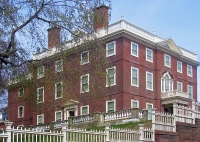
John Brown House
Designed by Joseph Brown for his brother John in 1786, sixth president John Quincy Adams once described the three-storey mansion on Power Street as being the most incredible and elegant private mansion ever seen on the continent of North America. The Georgian architecture features elaborate woodwork, French wallpaper, and 18th-century locally made furnishings. John Brown House also contains silver and decorative oriental objet d'art, gathered by John Brown who made his fortuning trading with China.
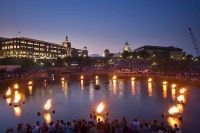
Waterplace Park
Providence's renovated downtown waterfront is known as Waterplace Park, a haven of romantic Venetian footbridges and cobblestone walkways that has won national and international design awards. Sited at the junction of three rivers, the river walk was the centre of the shipping trade in the city's early years. Today it draws enthusiastic crowds to the popular WaterFire events, held several times a year. This multimedia festival involves nearly 100 blazing braziers that rise from the river, seemingly to dance atop the water to the tune of rhythmic music. WaterFire events are not held to schedule and visitors can find out from the visitor information centre in the clock tower (open daily from 10am to 4pm) when the next is to be held. Free concerts and plays are also frequently held in the Waterplace Amphitheatre.
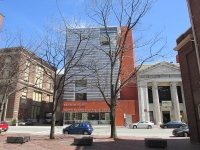
Rhode Island School of Design Museum
The small but comprehensive museum attached to the Rhode Island School of Design features many changing exhibitions, particularly relating to textiles. The museum's permanent collection includes the Abby Aldrich Rockefeller collection of Japanese prints, Chinese terracotta, Greek statuary, and some French Impressionist paintings. Highlights are works by masters such as Monet, Cezanne, Rodin, and Picasso. There is also an American section containing paintings by Gilbert Stuart, John Singleton Copley, and John Singer Sargent. Visitors should note that there are two entrances to the museum, the Museum's Benefit Street entrance and the Chace Center entrance at 20 North Main Street.
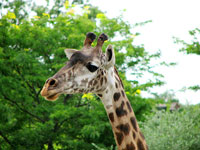
Roger Williams Park Zoo
Providence's zoo is situated in 16 hectares (40 acres) of beautiful woodlands and is accessed from Elmwood Avenue on the south edge of the city. The Roger Williams Park Zoo focuses on conservation and also contains a museum of natural history and a planetarium, as well as offering a relaxing spot to picnic, feed the ducks, ride a pony, or rent a paddleboat. The zoo is home to more than 900 animals from 156 different species, with display areas divided into different habitats, including rainforest and swamp. Animals on exhibit include cheetahs, elephants, snow leopards, red wolves, bison, and many more. Special features include an exhibit focusing on survival and adaption, as well as separate environments illustrating the natural worlds of both Africa and North America. There is also a wetlands trail, a mini trek reproducing the journey of Marco Polo, and a rainforest exhibition.
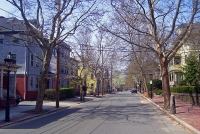
Benefit Street
Lined with an impressive concentration of original colonial-style homes, Benefit Street, Providence boasts one of the most extensive collections of 18th and 19th century urban architecture in America. The 'Mile of History' takes in all the well-restored buildings that were home to merchants and sea captains. The street overlooking the city's waterfront also features churches and museums. The Providence Preservation Society cares for the area, providing information about the buildings and escorted tours from their office at 21 Meeting Street.
Eating Out
Providence is one of the unlikely gourmet hotspots in the USA, with a higher per capita number of restaurants than any other city in the country. The Johnson and Wales University of Providence runs well-known culinary arts courses, its graduates contributing to the high quality of restaurants.
Downtown and Federal Hill are two of the most prominent restaurant scenes in Providence. Downtown is an area circled by Memorial Avenue, Dyer Street, Fountain Street, and Empire Street, filled with a variety of cuisines. Popular establishments include Cafe Nuovo and the Capital Grille.
Federal Hill in Providence boasts the highest concentration of restaurants in the city. The Little Italy of Providence, it covers both Italian and international food. Atwells Avenue is at the centre of the neighbourhood and over twenty restaurants line one quarter-mile of the avenue. Angelo's on Atwells Avenue has been around since 1924 and is a Providence institution.
Getting Around
The RIPTA bus service can get one almost anywhere in Providence. It's the most inexpensive way to travel around Providence, along with water taxis and ferry boats which operate daily. The government sets taxi rates but working meters are required in all taxis. Lyft and Uber are also available.
Hiring a car is also a great way to get around Providence, especially for visitors wanting to explore outside the city. Most attractions are near enough to reach on foot when travelling through the downtown area of Providence.
Providence Climate and Weather
Providence has a humid continental climate. Summer (June to September) has an average daily high temperature above 73F (23C) with a low of 66F (19C). Winter runs from December to March with an average daily high temperature of 45F (7C) dropping to lows around 21F (-6C).
In the summer, there are occasional thunderstorms and a slight threat of hurricanes. It is fairly wet, with an annual average rainfall of 45 inches (1,140mm). However, this spreads evenly throughout the year and doesn't interfere too seriously with holidaymakers' enjoyment of the island's hot summers.
During winter there is also light rain, but mostly snowfall. Snowfall is the highest during January. The best time to visit Providence is during spring and summer (May to September).
United States of America travel info
Electricity
The electrical current is 120 volts, 60Hz. Plugs are mainly the type with two flat pins, though three-pin plugs (two flat parallel pins and a rounded pin) are also widely used. European appliances without dual-voltage capabilities will require an adapter.
Language
English is the most common language spoken but Spanish is often heard in the south-western states.
Money
The official currency is the US Dollar (USD), which is divided into 100 cents. Only major banks exchange foreign currency. ATMs are widespread and credit cards are widely accepted; Apple Pay and Google Pay are very popular. Banking hours are Monday to Friday 9am to 3pm.
Tipping
A 15 percent tip is expected by taxi drivers, bartenders, hairdressers and waiters, but travellers shouldn't tip in fast-food or self-service restaurants. In expensive restaurants or for large parties, the tip should be 20 percent of the bill. It's normal to tip staff such as valets and porters in hotels; this is discretionary, although a minimum of $5 is expected. Most services are customarily tipped if the service is good.
Health
There are no specific health risks associated with travel within the USA. Medical facilities are excellent, but expensive. Only emergencies are treated without prior payment and treatment can be refused without evidence of insurance or proof of funds. Good medical insurance is essential.
Safety
Travel within the United States is generally trouble-free, though travellers should be aware that the US shares with the rest of the world an increased threat from terrorist incidents. Security has been heightened, particularly at airports. Restrictions on hand luggage apply and travellers are advised to check on the latest situation with airlines in advance. Travellers should also be alert to the dangers of car and street crime in cities and should use common sense and take basic precautions. Hurricanes are common between June and November, putting the southern USA, including the Gulf Coast and the eastern US at risk. There's a risk of wildfires in many dry areas in the US, particularly on the West Coast from March to November.
Local customs
Laws vary from state to state, including speed limit, fines and punishment. The age at which alcohol may be legally bought and consumed is 21 years.
Doing business
In such a large country, filled with so many diverse groups, business practices may differ according to each state, though rarely to any large degree. The East Coast is traditionally more formal than the West Coast, though in states such as California, dress code and conservative appearance are as common as they would be in New York. Punctuality is important throughout the country and it's considered rude to be late for a meeting. Gift-giving is uncommon as it may be construed as bribery. Appropriate titles (Mr, Mrs, Ms) are used upon introduction and until otherwise stated. Americans favour politeness and greetings of 'Hello' and 'How are you?' are often expressed with sincerity. Business hours may vary in each state, but an 8am start and 5pm finish Monday to Friday is the most common with an hour over lunch.
Status and age are not necessarily indicative of seniority, nor do they carry much weight in themselves. Those doing business in the States should be mindful of this fact; foreigners should never make assumptions about someone's position or rank. Best practice is to be respectful to all parties. That said, the US upholds a hierarchal business structure in which 'the boss' is the ultimate decision-maker. Senior leaders have the power of the last word, and can go against the grain just as easily as they can follow popular opinion. Foreigners should concentrate on winning over this individual, even if the greater group seems unsupportive. Americans value a direct style of communication. In this fast-paced, consumer culture 'time is money', and small-talk is viewed as unnecessary and wasteful. It's best for foreigners to get to the point quickly, speak about issues in a frank and open manner, and to avoid taking offence if someone questions or challenges them outright.
Duty free
Travellers to the United States who are returning residents of the country do not have to pay duty on articles purchased abroad to the value of $800 provided their stay was longer than 48 hours and their duty-free allowance was not used in the 30-day period prior. For passengers arriving from Samoa, Guam and the U.S. Virgin Islands, a duty-free allowance of $1,600 is allowed. The following items are included in this: 50 cigarettes and 10 cigars and 150 millilitres (5 fl. oz.) of alcoholic beverages or 150 millilitres (5 fl. oz.) of perfume containing alcohol. Restrictions may apply to goods from Cuba, Iran, North Korea, Burma (Myanmar), Angola, Liberia and Sudan. It is prohibited to import Cuban cigars from any country.
Travellers to the United States who are non-residents do not have to pay duty on the following items: 50 cigars or 200 cigarettes and gifts to the value of $100 provided their stay in the USA is not less than 72 hours and that the allowance has not been used in the preceding six-month period.
Prohibited items for residents and non-residents include meat or meat products, poultry, narcotics, absinthe, plants, seeds, vegetables, fruits, soil, live insects and other living plants or animal pests. Fish is prohibited unless it carries disease-free certification. Wildlife and animals or their by-products carry restrictions. Dairy products and eggs from specified countries are not allowed. Firearms and ammunition are not allowed without the necessary license and permit.
Communications
The international country dialling code for the United States is +1. Mobile networks cover most of the country, especially all urban areas; travellers can purchase local prepaid SIM cards for unlocked phones or use eSIMs if their cellular providers support it on their networks. WiFi is widely available.
Passport & Visa
It is highly recommended that travellers' passports have at least six months' validity remaining after the intended date of departure from them travel destination. A visa is required for short visits unless travellers qualify for entry under the Visa Waiver Program.
The Visa Waiver Program (VWP) enables citizens of certain countries to travel to the US for a stay of up to 90 days without a visa. Visitors under the VWP need a valid Electronic System for Travel Authorization (ESTA), which allows the US government to screen all visitors before travel. Visitors entering the country under the VWP must have a machine-readable passport (MRP) that has a barcode on the photo page. Travellers under the VWP must have passports that include biometrics if they wish to enter the country without a visa, which means that passports must contain unique personal data such as fingerprints or iris details. All passports must contain a digital photo image in order to travel visa-free. All visitors to the USA have a photograph and two fingerprints taken by an inkless scanner on arrival, including those travelling visa-free under the VWP.
As part of the Western Hemisphere Travel Initiative (WHTI), all travellers travelling between the United States and Canada, Mexico, Bermuda, and the Caribbean region are required to present a passport or other valid travel document to enter or re-enter the United States. If departing from the USA, a valid passport is required by immigration authorities. Immigration officials often apply different rules to those stated by travel agents and official sources.
Entry requirements
US citizens require passports.
UK nationals require a passport valid for duration of stay. Most passport holders can get an Electronic System for Travel Authorisation (ESTA) through the Visa Waiver Programme, which allows travel to the US for up to 90 days. The VWP includes tourism, certain types of business visit and transit to another country.
The most important requirement on entering the U.S. is providing proof of Canadian citizenship. A valid Canadian passport is the best document to prove Canadian citizenship and the right to return to Canada. However, several other documents can serve, depending on the mode of transport. Generally, Canadian citizens do not require visitor, business, transit or other visas to enter the United States from Canada, though there are some exceptions.
Passports must be valid for the period of intended stay. If visiting the US for fewer than 90 days, Australian nationals may be eligible to apply for an Electronic System for Travel Authorization (ESTA), and enter under the Visa Waiver Program (VWP).
South Africans must hold a passport valid for duration of stay. A visa is required.
Passports must be valid for duration of stay. Irish nationals can get an Electronic System for Travel Authorisation (ESTA) under the Visa Waiver Programme for entry into the United States.
Passports must be valid for duration of stay. New Zealand nationals can get an Electronic System for Travel Authorisation (ESTA) under the Visa Waiver Programme for entry into the United States.
Useful contacts
United States Tourist Office: www.usatourist.com
911 (General)Embassies / consulates in other countries
United States Embassy, London, United Kingdom: +44 20 7499 9000.
United States Embassy, Ottawa, Canada: +1 613 688 5335.
United States Embassy, Canberra, Australia: +61 2 6214 5600.
United States Embassy, Pretoria, South Africa: +27 12 431 4000.
United States Embassy, Dublin, Ireland: +353 1 668 8777.
United States Embassy, Wellington, New Zealand: +64 4 462 6000.
Embassies / consulates in United States of America
British Embassy, Washington DC: +1 202 588 6500.
Canadian Embassy, Washington DC: +1 202 682 1740.
Australian Embassy, Washington DC: +1 202 797 3000.
South African Embassy, Washington DC: +1 202 232 4400.
Irish Embassy, Washington DC: +1 202 462 3939.
New Zealand Embassy, Washington DC: +1 202 328 4800.


